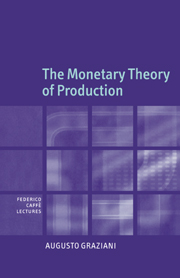Book contents
9 - Concluding remarks
Published online by Cambridge University Press: 03 July 2009
Summary
General features of the circulation approach
In its more general aspect, the so-called circulation approach to the analysis of the economic process is no more than a presentation of the successive phases describing the creation, circulation and final destruction of money. While in itself this should not give rise to fundamental divergences from the more traditional and still dominant theory, it so happens that in a number of specific, but vital, cases the conclusions reached by the circulation approach seem to be radically different. The main divergences can be synthesised as follows.
The nature of the market
In the neoclassical model, the market, so long as perfect competition prevails, is considered as a totally democratic and egalitarian mechanism. Any inequalities in the distribution of income and wealth do not depend on the operation of the market mechanism itself, since agents are admitted to negotiations on an equal footing, no matter what the nature or the amount of the goods and services demanded or supplied may be. Of course agents endowed with a higher purchasing power will exert a greater influence on the equilibrium price as compared to less-endowed agents; but, while this may be considered as a case of unequal power, it depends on an unequal income distribution and not on the working of the market per se.
If, always remaining within the neoclassical perspective, we enquire about the possible origins of the inequalities in income distribution, these will appear as being largely justified.
- Type
- Chapter
- Information
- The Monetary Theory of Production , pp. 144 - 158Publisher: Cambridge University PressPrint publication year: 2003



